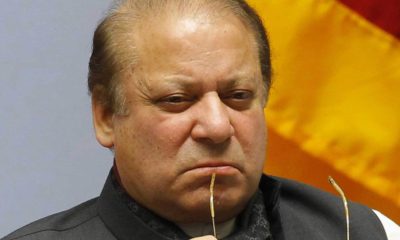World
Don’t mistake patience as weakness: Gen. Sharif to India
Islamabad: Pakistan’s outgoing army chief General Raheel Sharif on Tuesday warned India that “mistaking our policy of patience for weakness” would prove “dangerous”. Gen. Sharif was speaking at the ‘Change of Command’ ceremony at the General Headquarters in the garrison town in Rawalpindi, capital Islamabad’s twin city, the military’s media wing said.
General Qamar Javed Bajwa officially took charge as the 16th army chief of Pakistan during the ceremony, the media wing said. In his farewell speech at the ceremony, attended by former army chiefs, federal ministers and foreign diplomats, Gen Raheel Sharif stressed the need for institutions to work together for the nation’s progress, and cautioned India against adopting an aggressive stance in the region.
He referred to the Kashmir Valley and said, “In recent months, India’s increasing terrorism and aggressive stance in IHK (Jammu and Kashmir) have endangered the region.” “India should know that mistaking our policy of patience for weakness would be dangerous.”
Sharif said he always prioritised national interest in every decision he made during his tenure. But the security situation in the region remains “complicated”. During the ceremony Gen. Sharif handed over the “command stick” to General Bajwa — signifying the changeover of the army command.
Gen. Bajwa has spent a considerable part of his military service in the Rawalpindi-based 10 Corps, which is responsible for guarding the Line of Control (LoC) that divides India and Pakistan. However, his time at the 10 Corps was a period of relative quiet following the 2003 ceasefire accord. However, he takes command amid serious escalation of tensions on the LoC, which saw some of the intense exchange of fire in the past few months.
On a personal level, Gen. Bajwa is said to be witty, accessible, well-connected with the troops and not fond of limelight. He is the fourth officer from the infantry’s Baloch Regiment to become the army chief. Before him, Gen. Yahya Khan, Gen. Aslam Beg and Gen. Kayani rose to that position.
World
Lockdowns in China Force Urban Communities to Defy Censorship and Vent Frustration Online

Shanghai’s rich middle class is leading a wave of online dissent over the strict and prolonged lockdowns imposed in various parts of the country. Chinese internet censorship is struggling as patience is wearing thin in many urban centers, coming up with creative forms of online protests.
Social Media Posts Revealing Lockdown Tension in Shanghai
Drawn-out lockdowns are nothing new in China as authorities insist with the nation’s zero-Covid policy since the start of the pandemic. Currently over This time around, however, metropolitan areas like Shanghai are increasingly difficult to keep quiet, given that its more than 25 million residents have seen weeks of total isolation along with food shortages and many other service interruptions.
Dozens of towns and reportedly over 300 million Chinese citizens have been affected by lockdowns of different severity. As expected, urban netizens have been most outspoken over their difficulties by finding creative ways to get around state censorship and bans placed on topics, news comments and spontaneous campaigns.
Shanghai residents have been using mobile proxies and hijacking seemingly unrelated hashtags to talk about healthcare issues, delivery failures and the overall severity of their situation. The “positive energy” that the Chinese government wants to transmit during the recent prolonged series of lockdowns does not come naturally to those counting food supplies and online censors are working hard to filter words, trending topics and undesired social media sharing.
WeChat groups and message threads are under constant monitoring. Posts questioning the zero-Covid approach have been quickly deleted, including by leading Chinese health experts like Dr. Zhong Nanshan. Video footage is soon censored and protests and investigations are quickly made to disappear.
Where this has not worked, officials have exposed banners with warnings and outright threats like “watch your own mouth or face punishment”, while drones have been patrolling the city skies. Yet, if anything, this has led to further tensions and unspoken confrontation with Shanghai’s educated and affluent middle class.
Creative Online Solutions Harnessing Civic Energy
Announcements by Chinese social media that they would be publishing the IP addresses of users who “spread rumors” have not helped either. Tech industry research has shown that much of Asia’s tech-savvy population has a habit of using mobile proxies and other privacy tools, quickly finding workarounds to browse the internet freely and talk to the world about the hottest topics.
The sheer volume of forbidden posts is already a challenge for the very censorship system, experts explain. Unable to track all trending hashtags, state workers overlook topics that speak about the US, Ukraine or other popular news. Linking human rights elsewhere to their situation, Chinese online dissidents establish their informal channels and “hijack” the conversation to share personal or publicly relevant information about the Covid suppression in their town.
Sarcastic and satirical posts still dominate. Others hope to evade the censors by replacing words from famous poems or the national anthem. One thing is certain – social media, when harnessed with the right creativity, has proven its ability to mount pressure on the government in even some of the most strictly controlled tech environments like China.
























